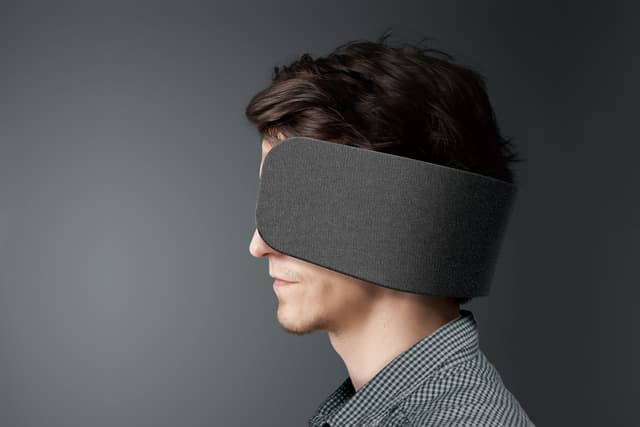Meg Ely | July 19, 2019
Why is this interesting? - The Crime App Edition
On crime, perception, and the rise of hyperlocal apps
Recommended Products

WEAR SPACE is akin to horse blinders for the modern worker, designed to establish a personal space for focus in open offices or while being a digital nomad. It is adjustable to varying levels of concentration needs.
Meg Ely (ME) is the Head of Social at Bloomberg and has also worked at the New Yorker and the Washington Post. We are excited to have her write about a very modern phenomenon, the rise hyperlocal citizen apps. - Colin (CJN)
Meg here. Crime has always been a source of fascination for people. A cliche like “if it bleeds, it leads” contains some truth, and switching on the nightly news or picking up a New York tabloid can easily lead you to believe we live in a world infested with robbery and murder. With that said, the more distant the crime, whether physically or emotionally, the more abstract it can feel.
But when it’s hyperlocal — in your neighborhood, just down the street — the feeling is a lot more visceral. I commute by subway each day, and whenever there’s an incident at my local station it feels as though I have a personal connection to what’s happened. It seems like it could happen to me.
But my fear is probably overblown. According to Pew Research, violent crime in the United States has fallen over the past decade. And while The New York Times reports that subway crime is up 3.8% last year, it has fallen since the peak of the 1980s and 1990s. I might hear about the occasional cellphone robbery, but it’s still incredibly unlikely I’ll get my iPhone stolen Monday morning.
Why is this interesting?
I was struck by just how much this fear might be spreading after reading Rani Molla’s Vox piece about the social apps Nextdoor, Citizen, and Amazon’s Neighbors. Each of these apps “allow users to view local crime in real time and discuss it with people nearby.” In other words, instead of waiting for the nightly news to hear about a crime that occurred two neighborhoods away, you get a push notification to let you know one was just reported four doors down. Fear is never more than a buzz away.
What’s more, rather than relying on official reports and signals, these apps let users post about “unconfirmed sources” and “suspicious” people, dialing up our anxiety. “These apps have become popular because of — and have aggravated — the false sense that danger is on the rise,” Molla writes.
Like Twitter or Facebook, Citizen, Nextdoor, and Amazon’s Neighbors have the power to keep users in an echo chamber of their own making. While social platforms have proven to be an effective way to make vast social groups hate one another, these crime reporting apps make us fear our neighbors. They can easily become an echo chamber of negativity — fear is compounded upon the fear of the other users. What’s particularly troubling about all this is it happens at a moment where crime is actually on a prolonged and historic downswing. Unfortunately, as Molla points out, that doesn’t stop us from believing the opposite:
Opinion surveys regularly find that Americans believe crime is up nationally, even when the data show it is down. In 18 of 22 Gallup surveys since 1993 that have asked about national crime, at least six-in-ten Americans said there was more crime in the U.S. compared with the year before, despite the generally downward trend in national violent and property crime rates during most of that period.
Apps like Nextdoor bring what was unknown — the report of a suspicious person — and makes it known to otherwise blissfully unaware people. This can only serve to make us more fearful of one another and worse, promote long-standing stereotypes and racial profiling. We’re left with the impression that our cities and streets are far more unstable than they actually are. (ME)
????? of the Day:
This thing is called WEAR SPACE from Panasonic and, as you can tell, is basically horse blinders for the modern worker. “As open offices and digital nomads are on the rise, workers are finding it ever more important to have personal space where they can focus. WEAR SPACE instantly creates this kind of personal space – it’s as simple as putting on an article of clothing. The device can be adjusted based on the level of concentration you desire, so it adapts to the various situations you’ll find yourself in.” I’ve had tyranny of the open office on my WITI topic list for awhile now, gotta get that written up. (NRB)

Quick Links:
Roger Ebert’s 1990 review of Joe Versus the Volcano is pretty amazing. Here’s the first paragraph: “Gradually during the opening scenes of ‘Joe Versus the Volcano,’ my heart began to quicken, until finally I realized a wondrous thing: I had not seen this movie before. Most movies, I have seen before. Most movies, you have seen before. Most movies are constructed out of bits and pieces of other movies, like little engines built from cinematic Erector sets. But not ‘Joe Versus the Volcano.’ It is not an entirely successful movie, but it is new and fresh and not shy of taking chances. And the dialogue in it is actually worth listening to, because it is written with wit and romance.” (NRB)
The founder of WeWork cashes out early. Ethical concerns abound. (CJN)
Thanks for reading,
Noah (NRB) & Colin (CJN) & Meg (ME)